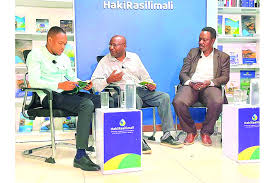On Park Road in Nairobi, the smell of fresh bread fills the air. Behind the ovens, a team of bakers works quickly, kneading dough and sliding trays into the oven.
This is Nairobi Deaf Bakery, a unique workplace where nine of the ten employees are deaf.
At the heart of the bakery is Priscillar Ndingu, the Operations Manager. She oversees everything from mixing ingredients to the final packaging of bread, biscuits, and cakes. Communication here is done entirely in sign language.
“This is proof that deaf people can learn skills and work just like anyone else,” Priscillar says. “This bakery is our lifeline. Through it, we feed our families and build our future.”
Among the bakers is Samuel Maweu, the production supervisor. Though he lost his hearing as a toddler, he never lost hope. After finishing school, he chose to train as a baker.
“Through this work, I can support my family, especially my younger siblings,” Samuel says. “One day, I hope to help my brother become a chef.”
Deliveries are handled by Charles Kimiti, who makes sure every loaf reaches customers on time. Though deaf, Charles confidently rides his motorbike through Nairobi’s busy roads.
He carries a sign showing other road users that he is deaf and relies on his sharp eyes to stay safe. Outside the bakery, he is also a competitive racer, proving that disability is no barrier to pursuing passions.
The bakery has become more than just a business. It is a symbol of empowerment and independence for the deaf community.
According to Abdi Abdille, Chairman of the Nairobi Deaf Association, it is a shining example of what is possible when people living with disabilities are given opportunities.
“Parents should expose their deaf children to skills and opportunities early,” Abdi says. “We must believe in their abilities.”
Every day, the Nairobi Deaf Bakery shows that with training, support, and determination, no disability can stop someone from working, earning a living, and chasing dreams.



